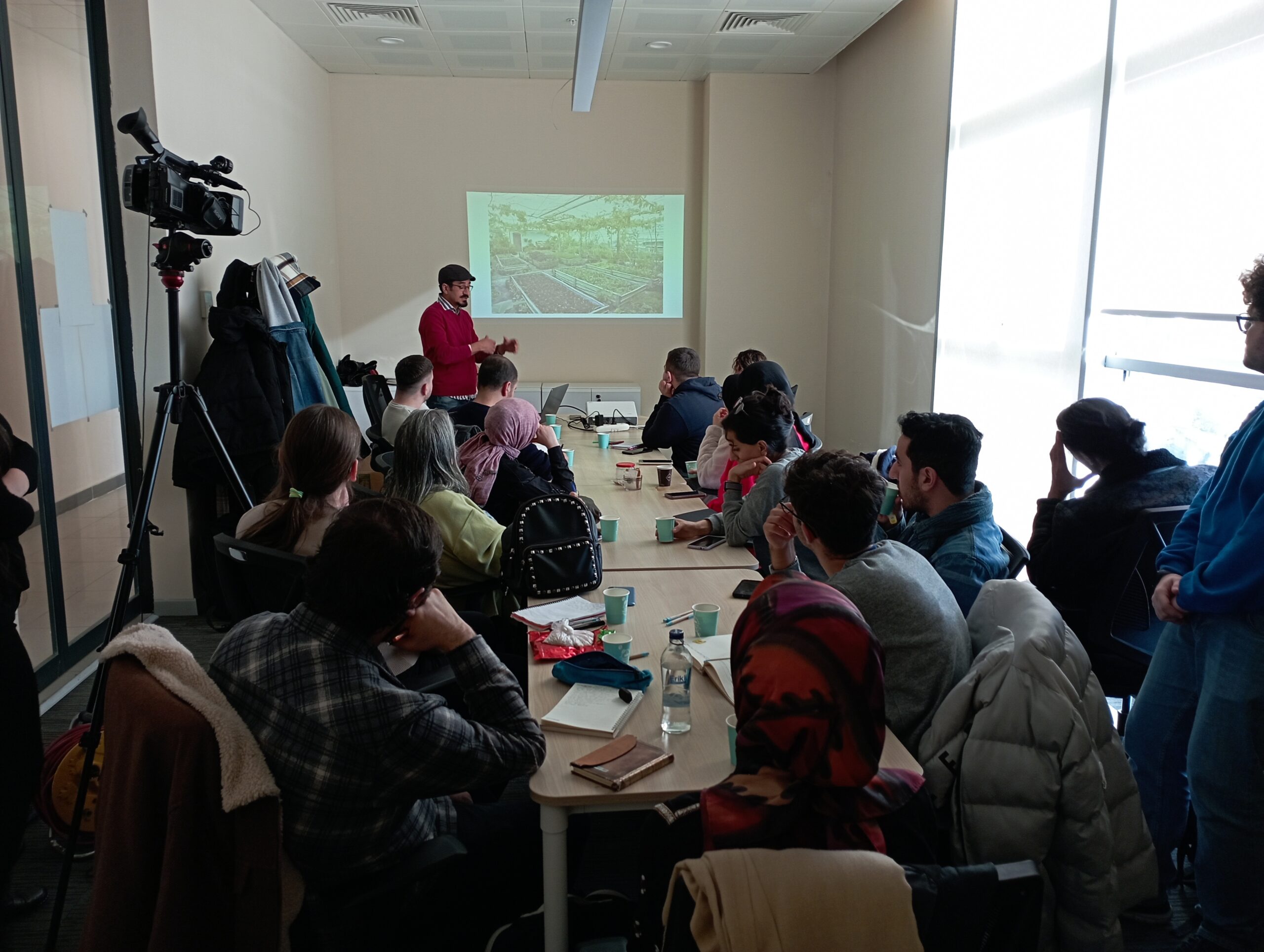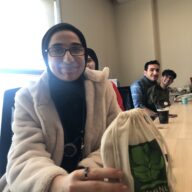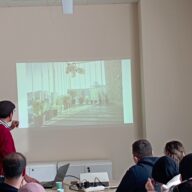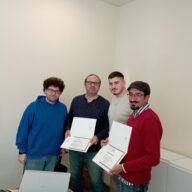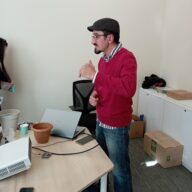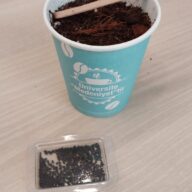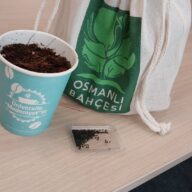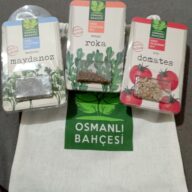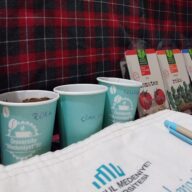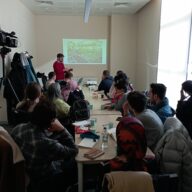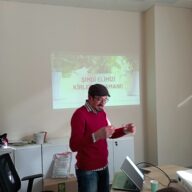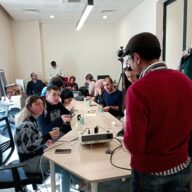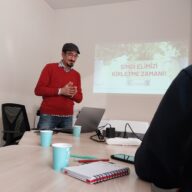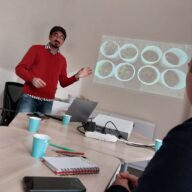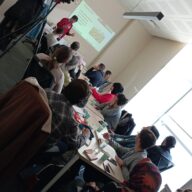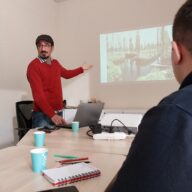As part of the “3rd Istanbul Medeniyet University Sustainability Week” activities, two “Balcony Gardening Workshops” were held on 20 and 21 December 2023. The workshops were organized by IMU Sustainability Office and IMU Sustainability Club in cooperation with Osmanlı Bahçesi and the workshop trainer was Savaş GÖNEN, Agricultural Technician / Agricultural Consultant / Permaculture Designer from Osmanlı Bahçesi. The workshops, which were open to the participation of all Istanbul Medeniyet University students, staff and the public, were held at Istanbul Medeniyet University Sustainability Office on Wednesday, December 20 and Thursday, December 21.
In the first phase of the two-stage workshops, the participants were provided with basic information on food production and balcony gardening, seed planting and plant care. In the second part of the workshops, which aimed to enable urban residents to have the skills to produce their own food and to popularize balcony gardening, seed planting was carried out using local seeds and vermicompost provided by Osmanlı Bahçesi.
Starting the theoretical training part of the workshop by explaining the important relationship between agriculture and agricultural production and sustainability, GÖNEN stated that Osmanlı Bahçesi is a local seed producer engaged in sustainable agricultural production in the Ahatlı village of Antalya and contributes to sustainable development goals with projects that emphasize ecological agriculture, rural development and female labor force participation. He said that they produce local, i.e. ancestral seeds using completely traditional methods and offer consumers vegetable growing kits that combine seeds and organic fertilizer. He emphasized that in the production of non-GMO and non-hybrid seeds, no harmful chemical pesticides and fertilizers are used; 100% organic vermicompost is used; and there is no synthetic chemical coating in seeds that are free from disease. He underlined that their aim is to make urban and hobby gardening widespread in our country, to make urban agriculture possible in 12 months of the year, to enable urban people to re-establish their connection with the soil and the indigenous seeds of Anatolia, and to popularize cost-effective, healthy and natural nutrition methods.
Giving examples of urban and balcony gardening in various periods in history, GÖNEN stated that in the Roman Empire, food production was also carried out in the villa courtyards and private gardens of rich families, although mostly for landscaping purposes. He stated that in potager, or potter’s gardens, which is a type of garden developed by monks in monasteries, more than one species can be planted together in the same area in a way that does not compete with each other by using intensified agriculture or companion planting method, as it is called today. He explained that as urbanization increased in ancient Greece, the roofs and courtyards of houses began to be used for agricultural practices and nature inclusive buildings appeared; on the other hand, in the American continent, the Aztecs produced self-sufficient, zero-waste production in agricultural areas called chinampas and that the plants grown in this extant agricultural production method also clean the pond water.
GÖNEN said that the concept of balcony gardening, which is more comprehensive than it is generally thought, can also be done in the form of urban gardening, roof or terrace gardening, vertical gardening and pot gardening and that urban gardening is a more professional agricultural production method covering all these other types. He stated that vegetables such as tomatoes, lettuce, parsley, basil, oregano, cucumber, basil, thyme, cucumber, arugula, cress; medicinal aromatic plants such as echinacea, pomegranate, marjoram, lemon balm, medicinal chamomile, and zufa; some fruits such as strawberries, ground cherries, goji berries and a wide variety of flower species, including edible ones, can be grown on balconies. He emphasized that he himself has grown 29 types of plants on his balcony and that these plants support biodiversity and species richness by attracting a wide variety of creatures such as honeybees and wild wasps.
In his presentation, GÖNEN also provided some statistical information on the benefits of balcony gardening. He stated that more than 800 million people around the world are engaged in balcony gardening, 70% of the world’s population is fed by small farmers, and that urban gardeners have access to 37.5% more vegetables and fruits than other producers. He also stated that urban gardens have a much lower impact on climate change and pointed out that each 10.76 m2 of urban gardens can offset the annual carbon emissions of one car; in other words, every urban gardener can neutralize the carbon emissions of their own car, if any, by farming a small area. He also pointed out that urban gardens have much more species richness compared to conventional agriculture, and that although there are more than 6000 consumable plant species in the world, only certain species are focused on in agricultural production by taking into account various factors such as durability, and that urban dwellers usually feed themselves with about 30 plant species.
GÖNEN stated that in urban gardening, the soil structure is made more sustainable by rotational planting to prevent the soil in a small area from becoming barren. On the other hand, he pointed out that in industrial agriculture, where a single plant species is planted in very large areas, there is a risk of all crops getting sick when a plant is infected with a disease, while this risk can be reduced with diversified planting techniques such as permaculture. In addition, thanks to the faster delivery of products to consumers in urban gardens, food waste and environmental footprint due to transportation and storage are much lower, and food security and sustainable food consumption can be ensured thanks to these production areas. Compared to industrial agriculture, where many chemicals are used, urban and balcony gardening has very little pesticide pollution. Innovative and sustainable agricultural practices in urban gardens, which socialize people and increase access to fresh local food, are much more widespread thanks to urban gardeners experimenting with new methods and agricultural innovation. Finally, producers can generate income by selling their surplus produce fresh or by converting it into products such as canned goods.
During the theoretical training, tea, a symbol of Turkish identity, hospitality and social interaction, was offered to the participants by IMU Sustainability Office. In the practical part of the workshop, arugula and basil seeds provided by the Ottoman Garden were planted in the paper cups in which tea was served. In addition, the participants, who were given plant growing kits by the Ottoman Garden, took the first step toward becoming food producers with the seeds that they took home with them.
The workshop ended after the presentation of certificates of appreciation and gift sets to trainer Savaş GÖNEN and Osmanlı Bahçesi staff members.

